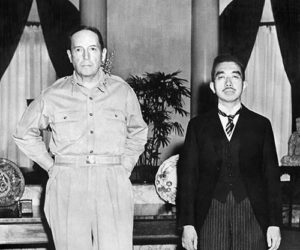Special to WorldTribune , January 24, 2017
By Michael Breen
SEOUL — The vision of the new American president, Donald Trump to “put America first” captures the shift in the American role in the world that has been going on for the past 25 years.
For all the policy nervousness it is causing here and in other capitals, this new vision is not a bad thing. In fact, I would argue, it is both timely and good.

To make this point, consider the role the U.S. has played internationally in the last century and consider what may lie ahead in the next century.
One hundred years ago this April, the U.S. joined World War One and emerged as a major actor on the international stage. A generation later, U.S. involvement in World War Two was the key factor in the defeat of fascism and the biological race theory that underpinned its European form.
Then, in the 40 or so years from the end of that war, when the European colonial powers were spent and communism swept through much of the world, the U.S. held the torch for freedom, democracy and human rights.
Americans acted in the world with a sense of manifest destiny that was underpinned by the Christian idea that it should be a “city on a hill,” an example of goodness for all to see. This was why, in contrast to the mean-spirited victors in World War One, whose vengeful punishment of Germany led directly to the rise of Nazism, Americans after World War Two felt called to be forgiving and do good. They helped rebuild their shattered allies and generously lifted up their defeated enemies, notably Japan, Korea and Germany, and turned them into their closest friends.
At the same time, the Americans stood against Soviet communism, which sought to win over as much of the world as it could for its utopian view of state organization.
Because of its internal contradictions, communism suffered a moral collapse from within. By the end of the 1980s, it was over.
Had communism prevailed, horrors such as those wrought on the Chinese, Cambodians and North Koreans would have played out all over the world. Without a global champion for democracy, God knows how global history would have turned out.
It is for this role, for being both a city on a hill and for being cool — giving us Coca-Cola, chewing gum, rock music, movies and everything else from jeans to bouncing on the moon — that the U.S. is unmatched in being loved, admired and emulated by foreigners since nation-states appeared in the 16th and 17th centuries.
Thanks to the U.S., the pace of economic growth and democratization since the end of World War Two has made it apparent that freedom, human rights, wealth and well being are universal, that every society wants it and knows that, if it is not heading in that direction, something is wrong. No alternative system is being offered.
What does this mean for our future? At some point soon, the world will be united, countries will be democratic and the poor will be lifted up. When that happens, countries will no doubt continue to exist, but they will be far less important.
Many countries, of course, will welcome it. Look, for example, how most welcomed joining the EU even though it meant surrendering some powers.
But for others, as with the UK in Europe, the fear of losing some measure of sovereignty can be an enormous struggle. The U.S. is likely to have a greater struggle than any, precisely because it has the most to lose.
That struggle has begun. This changing role of the U.S., the process by which it ceases to be the world’s policeman and becomes like any other country, has actually been going on since communism collapsed.
The U.S. can go back to being a regular country. As it does so, it will naturally put its own interests first. That is what every other country does. That the U.S. is now articulating this is a sign of the times. It is good. And it is something to which we should become accustomed.
Michael Breen, a British recovering journalist, is the CEO of Insight Communications Consultants, a public relations company, and author of “The Koreans” and “Kim Jong-II: North Korea’s Dear Leader.”
